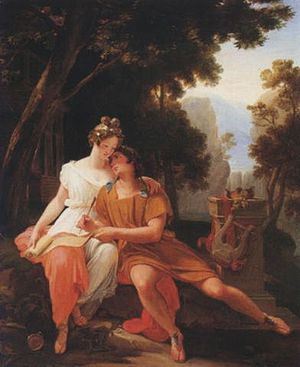Propertius 3.1:
“Spirits of Callimachus, holy remains of Philitas –
please, let me enter into your grove.
I first, a priest from the pure fount,
set out to carry the Greek dances through Italic revelry.
Tell me, in what cave did you tighten up your poems,
or with what foot did you begin? What water did you drink?
Damn everyone who delays Apollo in war!
Let the verse go once it has been perfected with a slender eraser –
the verse by which Fame lifts me aloft from the earth,
and by which the Muse triumphs with crowned horses,
where little Cupids are coveyed with me in a chariot,
and a crowd of authors follows my wheels.
Why do you give the reins and vie with me in vain?
A wide road is not given for running to the Muses.
O Rome, many may add your praises to their Annals
and sing of Bactria as the future limit of our empire.
But this work, which you read in peace, was born down
from the Muses’ mountain on an untouched road by our page.
Daughters of Pegasus, give the soft crowns to your poet:
that hard crown will not do for my head.
But what the jealous crowd will take from me alive,
Honor will return to me with double interest after my death.
Age makes everything greater after its passing:
after the funeral, a name sounds grander on people’s mouths.
For, who would know about the citadels overturned by a wooden horse,
and how the rivers went head-to-head with Achilles –
the Idaean Simois and Scamander, son of Jupiter –
and how Hector stained Achilles’ wheels three times through the fields?
Their own ground would have hardly known Deiphobus and Helenus and Paris (however he may have appeared) in Polydamas’ arms.
You would now be the subject of small conversation, Ilion,
and you, Troy, captured twice by the will of the Oetaean god.
Yet that Homer, rememberer of your fall,
sensed his work increase with age,
and Rome will praise me in the age of her late grandsons;
I prophesy that that day will come after my bones have become ash;
it has been provided, with Apollo’s approval,
that a stone will not be the only marker of my bones upon a despised grave.”

Callimachi Manes et Coi sacra Philitae,
in vestrum, quaeso, me sinite ire nemus.
primus ego ingredior puro de fonte sacerdos
Itala per Graios orgia ferre choros.
dicite, quo pariter carmen tenuastis in antro
quove pede ingressi? quamve bibistis aquam?
ah valeat, Phoebum quicumque moratur in armis!
exactus tenui pumice versus eat,
quo me Fama levat terra sublimis, et a me
nata coronatis Musa triumphat equis,
et mecum in curru parvi vectantur Amores,
scriptorumque meas turba secuta rotas.
quid frustra immissis mecum certatis habenis?
non datur ad Musas currere lata via.
multi, Roma, tuas laudes annalibus addent,
qui finem imperii Bactra futura canent.
sed, quod pace legas, opus hoc de monte Sororum
detulit intacta pagina nostra via.
mollia, Pegasides, date vestro serta poetae:
non faciet capiti dura corona meo.
at mihi quod vivo detraxerit invida turba,
post obitum duplici faenore reddet Honos;
omnia post obitum fingit maiora vetustas:
maius ab exsequiis nomen in ora venit.
nam quis equo pulsas abiegno nosceret arces,
fluminaque Haemonio comminus isse viro,
Idaeum Simoenta Iovis cum prole Scamandro,
Hectora per campos ter maculasse rotas?
Deiphobumque Helenumque et Pulydamantis in armis
qualemcumque Parim vix sua nosset humus.
exiguo sermone fores nunc, Ilion, et tu
Troia bis Oetaei numine capta dei.
nec non ille tui casus memorator Homerus
posteritate suum crescere sensit opus;
meque inter seros laudabit Roma nepotes:
illum post cineres auguror ipse diem.
ne mea contempto lapis indicet ossa sepulcro
provisumst Lycio vota probante deo.

Reblogged this on Talmidimblogging.